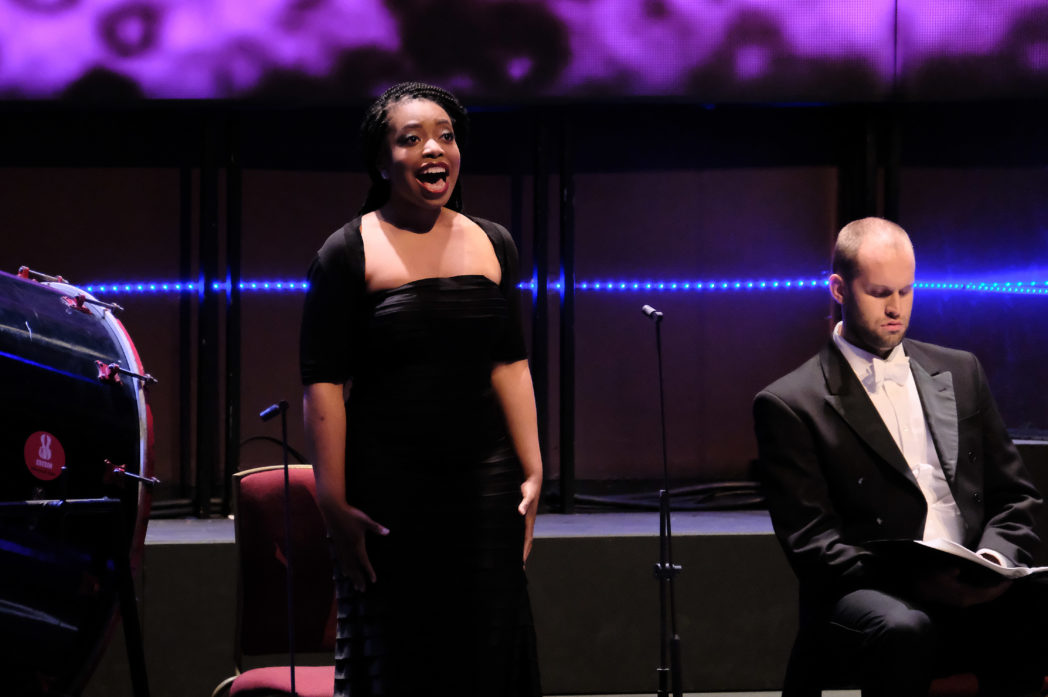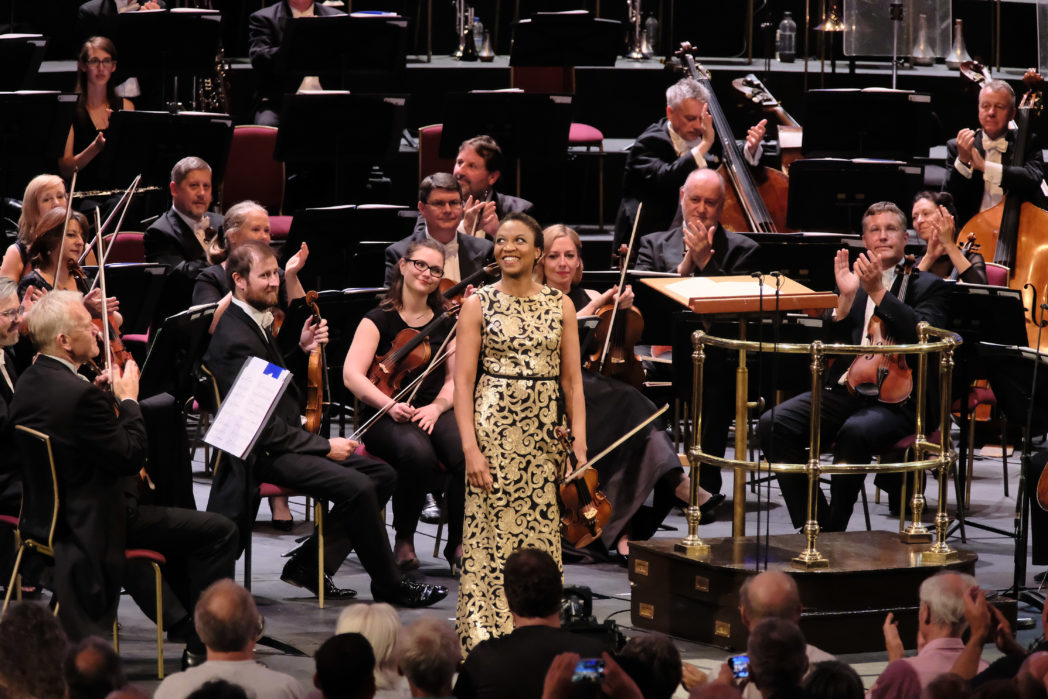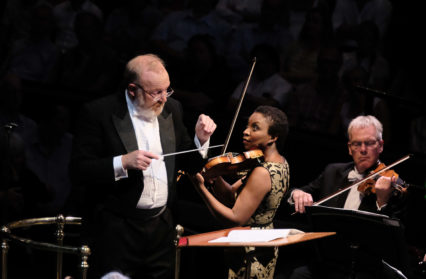David Truslove attended Prom 17 at the Royal Albert Hall for an evening of Parry, Vaughan Williams, Parry and Holst from BBC National Orchestra of Wales conducted by Martyn Brabbins.
The platform at the Royal Albert Hall may have been filled with a choir and orchestra from the Welsh capital, but it was decidedly English music that made up this generously filled programme. As well as honouring the death a century ago of Sir Hubert Parry, the concert also provided a snapshot of English music either side of the Great War which drew personal responses from two of his best-known pupils, Gustav Holst and Ralph Vaughan Williams. These works highlighted the stylistic distance travelled from Parry’s German-influenced scores to a more individual mode of expression as part of a younger generation searching for a new musical identity.
Parry’s orchestral music has not fared well in the concert hall, and only the last of his five symphonies has been heard (twice) at the Proms. Subtitled Symphonic Fantasia ‘1912’, his Fifth merges four traditional movements into a single, thematically-linked span that bears kinship with Schumann’s similarly structured Fourth Symphony. While the individual sections are headed: ‘Stress’, ‘Love’, ‘Play’ and ‘Now’, it is only the third ‘movement’ that reveals any distinct character, and one mediated by Ländler-like gestures associated with Mahler and a certain Mendelssohnian brio. Hints of Elgar are present in the gloriously lyrical slow movement, yet the finale’s majestic ambitions never quite materialise, despite the brief appearance of another fine melody. That said, conductor Martyn Brabbins and the BBC National Orchestra of Wales did the work proud, bringing much colouration to its Brahmsian hues (with beguiling solo contributions from oboe, horn and violin) and outlined its formal scheme with unfailing clarity.
Parry’s choral music needs little advocacy as regular performances of Blest Pair of Sirens, I was glad and Jerusalem make clear, yet his extended anthem Hear my words, ye people (written for vast forces for the 1895 Salisbury Diocesan Choral Association) was receiving its Proms premiere. Supported by Adrian Partington at the organ and augmented by brass and timpani, the BBC National Chorus of Wales was marvellously responsive to Parry’s setting of words from the Book of Job, as were Francesa Chiejina and Ashley Riches in their respective cameo roles. The uplifting hymn tune ‘O praise ye the Lord, praise him upon earth’ formed a rousing conclusion, its fervour and pomp revealing Anglican church music at its most splendid.

A stylistic gulf separates this work from Holst’s elegiac Ode to Death, one of several works in which the composer articulated his response to World War One and which, unlikely as it may seem, was also receiving its Proms premiere. Singers for its first performance at the 1922 Leeds Festival may have initially struggled with its daring, mystical harmonies and the consequent vocal challenges in terms of pitch and intonation. Here the chorus rose to the occasion with considerable assurance, and enunciated with exemplary clarity Walt Whitman’s consoling words from his ‘Leaves of Grass’ collection. Brabbins ensured the work’s calm dignity never lost momentum, and allowed Holst’s gently pungent orchestration (including unearthly harp and celesta) to bloom. The choir’s hushed closing chord was magical.

Before the interval a leisurely account of The Lark Ascending by Holst’s great friend Vaughan Williams had kept the audience spellbound. American violinist Tai Murray imbued this ‘Romance’ with wonderful poise, her pure, even tone creating a hall-stilling intimacy that made you hold your breath with the wonder of it. At times the sounds from both soloist and orchestra were almost too delicate, but in terms of poetic expression and flawless technique this lark ‘… ever winging up and up’ (as George Meredith’s eponymous poem puts it) could not have had a more eloquent performance. As if dismissing at a stroke all airborne ruminations Murray returned to play Ruggiero Ricci’s arrangement of Tárrega’s guitar piece Recuerdos de la Alhambra which, despite some suspect tuning, was ample proof of her cross-bowing facility.
The programme ended with another symphony: the more radical Third by Vaughan Williams whose ‘Pastoral’ appellation gives little indication of its tragic undercurrent and memorial stature. Brabbins launched the opening movement with no-nonsense efficiency and, if lacking in gravitas, its thematic material was unveiled with clear-sighted vision. The second movement’s atmospheric offstage trumpet (courtesy of Neil Brough) brought to mind Vaughan Williams’s own experience of hearing a bugler practising on the Western Front; and here, juxtaposed with mournful horn and strings, it became intensely poignant.
Jaunty woodwind and brass coloured the swift-moving third movement and, while its pesante marking seemed largely absent, Brabbins’ tempo produced some superbly fleet-of-foot string playing in its closing pages. More expansive paragraphs unfolded in the final Lento which encompassed Chiejina’s heaven-bound wordless soprano (if a touch forced at the top of her range) and playing of immense grandeur and sensitivity to bring this powerful symphonic journey to a heart-easing close.
Prom 17 Royal Albert Hall, London, Friday 27th July 2018
Parry – Symphony No. 5 in B minor
Vaughan Williams – The Lark Ascending
Parry – Hear my words, ye people
Holst – Ode to Death
Vaughan Williams – Pastoral Symphony (No. 3)
Tai Murray (violin)
Francesa Chiejina (soprano)
Ashley Riches (bass-baritone)
Adrian Partington (organ)
BBC National Chorus of Wales
BBC National Orchestra of Wales
Conductor: Martyn Brabbins
Header photo: Martyn Brabbins conducts BBC NOW, with soloist Tai Murray, Prom 17. Photo by Mark Allan.
David Truslove has spent much of his life singing (with nearly 20 years as a Lay Clerk at Winchester Cathedral), conducting choirs and part-time teaching. He now writes programme notes and composes (a selection of his choral music is published by Chichester Music Press) and, whenever time permits, enjoys walking in the Welsh hills.











